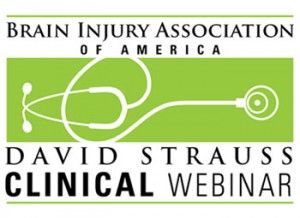2024.11.07 – A New Clinical Approach to Treating Anger after Brain Injury (Recorded Webinar)
A David Strauss Memorial Clinical Lecture recorded webinar featuring Dawn Neumann, Ph.D.
To download the webinar, choose the “Download Now” option from the dropdown below. After completing the checkout process, you will receive an email with further instructions and a file that includes information about receiving your ACBIS CEU.
Aired live on November 7, 2024. Includes 1 ACBIS CEU.
Note: A certificate of attendance/ACBIS CEU certificate will not be available with the purchase of this webinar after November 30, 2027.
In this David Strauss Clinical webinar, Dawn Neumann, Ph.D., FACRM describes newly identified factors, known as negative attributions, that significantly contribute to anger and aggression after brain injury. Dr. Neumann demonstrates two assessments that can be used to clinically evaluate a patient’s tendency toward negative attributions and describe a new clinical approach for treating anger and aggression associated with negative attributions called Intervention to Change Attributions that are Negative (ICAN).
Learning Objectives:
- Explain what negative attributions are and their relation to anger and aggression after brain injury.
- Discuss assessments that can be used to evaluate patients for negative attribution style thinking.
- Describe the ICAN approach to treating anger and aggression.
Includes 1 ACBIS CEU.
Speaker Bio
Dawn Neumann, PhD, FACRM is a tenured Associate Professor at the University of South Florida in the Department of Neurosurgery and Brain Repair. She has a PhD in Rehabilitation Science from SUNY Buffalo, NY and her MA in Psychology from Rutgers, NJ. Her research aims to advance the understanding and treatment of social cognition and emotion dysregulation deficits after traumatic brain injury. She serves on the Journal of Head Trauma Rehabilitation editorial review board, and has received several recognitions, including the ACRM Deborah Wilkerson Award, ACRM Mitchell Rosenthal Award, and the Joshua Cantor Scholar Award.


